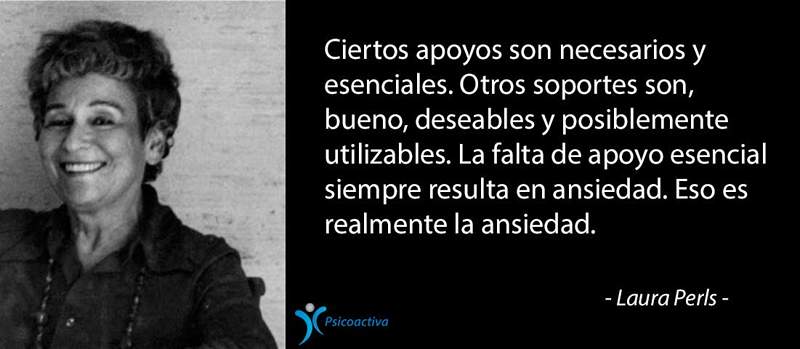17 Laura Perls phrases

- 4953
- 1537
- Herbert Ritchie
Laura Perls phrases may not be as abundant as those of other authors, such as her husband, for example, but there were traces of her deep thought.
Laura Posner, the real name of Laura Perls, did not leave behind so many famous phrases as if her husband did, Fritz Perls; This is because his shadow lived.
But, there are those who do consider that the true pioneer of the gestalt theory was her and, although there are not so many phrases of them, there are a few that can be glimpsed mostly in their interviews.
Let's review each of these phrases that condense the legacy of Laura Perls's great work.
17 Laura Perls phrases
During an interview for The Gestalt Journal, on May 23, 1977, Laura left the following statements that today are worth gold. This granted their interviewer Edward Rosenfeld and are the following:
The most enigmatic Laura Perls phrases
Certain supports are necessary and essential. Other supports are, well, desirable and possibly usable. The lack of essential support always results in anxiety. That is really anxiety.
Body work is part of Gestalt therapy.
Gestalt therapy is a holistic therapy. This means that the total body takes into account, not only the voice, the verbal, the action and whatever.
My body approach in Gestalt does not come from Wilhelm Reich or Moshe Feldenkrais or FM Alexander or Jl Moreno or anyone else, but from the modern dance that I have been doing since I was eight years old.
Everything used comes from the individual therapist. It is what, hopefully, has assimilated and integrated so that it has become part of its past, something you can trust; and of permanent consciousness in the therapeutic situation.
The weaning is done often very early or too late; And the foods that children eat first are completely puree and flours. Mothers are very impatient. Children drink food instead of learning to chew. Chewing requires time and patience and awareness of what one is chewing.
Pay close attention to the way people eat. I concentrate on the detailed activities of doing something: chew in addition to studying, putting on clothes, bathing or walking down the street. Thorough work.
Between assimilation and time taking. Drink does not take time. Swallowed immediately without any intermediate process. The eating process is an alert process.
How we eat, we grab something and make it assimilable.
The taste, the texture, the way it goes. When swallowing without chewing, his stomach weighs. Or you want to repeat it or pass indigestible.
The change is with all who practice it. Gestalt therapy has penetrated all kinds of other configurations. Without a doubt, it has become part of the program in professional schools around the world. On the west coast is probably the dominant therapy. Here, on the east coast, it is probably along with behaviorism, which is the other approach that is at the forefront.
The experience is on the limit. Within the limits there are to a large extent ignorance and confluence. If you go too fast beyond the limit, you may feel without support, in reality, that is what I work with: a concept and an experience of contact and support.
Anxiety is generally interpreted as lack of oxygen. But that is already secondary. It is only one of the supports that can be missing; or that it even mobilizes when fundamental support is missing; To retire and play the Tsarigüeya. A baby, for example, feels anxious when he doesn't hold him. You can feel great anxiety when you are hungry and your body does not work properly.
The resistances are the ones that interrupt contact and I prefer to call it blockages. Resistances are fixed gestalten. A block is a fixed Gestalt; An obsession is a fixed gestalt. Becomes a blockade in continuous development. There is always a repetition in the obsession with something that the patient does not transcend.
Yeah. First comes the conscience and then the deautomatization and taking it more to the foreground, exaggerating it, and hence the experimentation develops in different directions.
Things are and can become different. Of course, at any particular time, we can be interested in particular changes that we want to do at that time. Then we have to do again: how is that possible? What is available.
In addition, there is a certain satisfaction and perhaps even a momentary happiness for having lived and overcome some suffering during the development process. Coping. But that is temporary and the search for happiness, per se, even if it is written in the Constitution, it is a very illegitimate search, it is incidental.
These are only part of the most striking phrases of German psychologist and psychotherapist, Laura Perls, co -founder of the Gestaltic school.
Bibliography
- Humphrey, k. (1986). Laura Perls: A Biographical Sketch. Gestalt Journal.
- Perls, l. (1992). Concepts and Misconceptions of Gestalt Therapy. Journal of Humanistic Psychology, 32(3), 50-56.
- Rosenfeld, e. (1978). An oral history of gestalt therapy: i. A conversation with Laura Perls. Gestalt Journal.
- Serlin, i. TO. (1992). Tribute to Laura Perls. Journal of Humanistic Psychology, 32(3), 57-66.

